Future of Construction
The Future of Construction podcast brings together trailblazing leaders, industry executives, and tech pioneers to uncover the revolutionary technologies and forward-thinking strategies transforming the construction world. Hosted by Chloe Smith, CEO and founder of Mercator.ai, each episode offers an inside look at how these innovations are reshaping the future of the industry.
Episodes
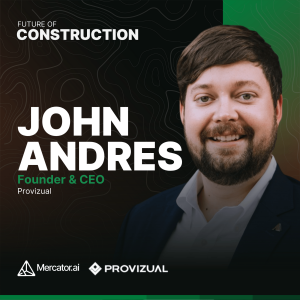
Tuesday Jun 03, 2025
Tuesday Jun 03, 2025
John Andres, Founder & CEO of Provizual is transforming how construction teams visualize project data by refusing to force them into rigid, office-centric workflows. In his conversation with Chloe on this episode of The Future of Construction, John explains why construction software must adapt to the messy realities of job sites rather than forcing standardization.
His comparison of construction to a "reversed assembly line" fundamentally reframes how we should approach project visualization and management. Drawing from his experience on both sides of the construction tech equation, John offers practical wisdom on data strategy, AI implementation, and why standardized processes are the critical foundation for future innovation.
Topics discussed:
Whereas manufacturing moves products through stationary workstations, construction moves trades through stationary locations — a fundamental difference that requires completely different visualization approaches.
Why locations change throughout a project lifecycle (from pours to levels to trade-specific zones) and how this dynamic nature creates visualization challenges that traditional software fails to address.
How John's "backwards" path into construction technology — focusing on field operations before VDC — created an advantage in developing practical tools that work in the "imperfect world" of actual job sites.
Capturing inspection histories that cities and municipalities don't preserve, enabling performance analytics that can inform future subcontractor selection and project planning.
Why construction teams don't need to understand AI's inner workings — they just need tools that function consistently regardless of how they're built.
Providing just enough customization for project-specific needs while maintaining data integrity for meaningful KPIs and cross-project comparison.
The "Walmart fear" that prevents general contractors from sharing performance data across the industry, despite potential collective benefits from transparency.
Why establishing consistent processes today, even without perfect digital tools, is the essential first step to leveraging AI and advanced analytics in the future.
Despite advances in BIM and 3D modeling, why PDFs remain the "lowest common denominator" that everyone on a project understands and will continue using for the foreseeable future.
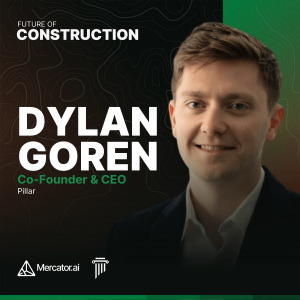
Thursday May 08, 2025
Thursday May 08, 2025
The traditional approach to land acquisition is undergoing a dramatic transformation thanks to technology pioneers like Dylan Goren, Co-founder & CEO of Pillar. In this episode of The Future of Construction, Dylan walks Chloe through how Pillar's platform is automating site selection and land acquisition for residential developers, turning what used to be weeks of manual work into minutes of efficient processing.
With a few clicks, users can identify sub-markets using points of interest like grocery stores or comparable properties, define their exact criteria for parcels and assemblages, and even execute bulk mailing campaigns to landowners — all within a single workflow.
Dylan also explains their ingenious paragraph interface that makes complex queries accessible to anyone, describing how one customer praised it as "idiot-proof in the best way possible." Unlike traditional data aggregators who lock information behind paywalls, Pillar is building an open architecture platform that empowers users to leverage public data in increasingly sophisticated ways, fundamentally shifting where competitive advantage comes from in real estate development.
Topics discussed:
The evolution of land acquisition from a manual, relationship-driven process to an automated, data-driven workflow that identifies thousands of precisely qualified parcels in minutes.
How real estate's competitive landscape is shifting from information opacity to strategic data interpretation as 99% of relevant information becomes digital and publicly accessible.
The architectural approach of building modular, open software tools that enable users to construct their own queries rather than forcing them into rigid, predefined workflows.
Strategies for translating complex technical capabilities into "kindergarten-simple" interfaces, including Pillar's paragraph-based query system that allows non-technical users to execute sophisticated data operations.
The growing specialization trend in real estate development, from vanilla multifamily to targeted niches like senior housing or micro-units, and how data tools must evolve to support increasingly specific market approaches.
Challenges in communicating new technological paradigms to an industry accustomed to traditional tools, and how demonstration-based education creates breakthrough aha moments.
The technical infrastructure behind processing petabytes of public data, including using AI as a translation layer to standardize inconsistent information from volatile sources.
How bootstrapping a technology company with a small team forces discipline and customer-centricity, resulting in highly focused solutions to real market problems.
The future vision of real estate technology as personalized tools that adapt to individual workflows rather than forcing users to conform to standardized processes.
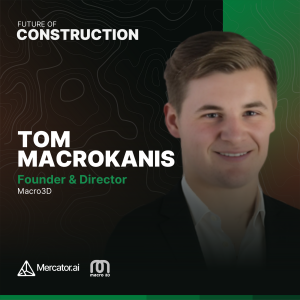
Thursday Apr 10, 2025
Thursday Apr 10, 2025
Construction 3D printing is positioned to revolutionize how we build, but the path to mass adoption is paved with regulatory hurdles and financial challenges. In this episode of The Future of Construction, Tom Macrokanis, Founder & Director of Macro3D, shares his journey from software developer to pioneering 3D concrete printing in Australia.
Tom tells Chloe how he created a profitable steel fabrication business specifically to fund his printing technology, the challenges of convincing skeptical builders that 3D printed walls function like double brick construction, and his data-driven approach to quality assurance — tracking every material property throughout the printing process.
Despite battling constrained investment environments and construction payment terms that leave "hundreds of thousands in unpaid invoices," Tom remains committed to solving Australia's housing shortage through faster construction methods that require fewer workers.
Topics discussed:
How to implement a dual company funding model for hardware innovation when traditional VCs won't invest, creating a profitable service business (steel fabrication) with immediate revenue to systematically fund long-term R&D for revolutionary construction technology.
Navigating regulatory frameworks with the building code parallel mapping strategy that identifies existing approved construction methods with structural similarities to new technology, creating certification pathways by demonstrating functional equivalence to established methods like double brick construction.
Why speed-to-market trumps cost advantage in early-stage construction innovation, for examples focusing on reducing build time by 30-40% while maintaining industry-standard pricing around $300/sqm, rather than immediately passing all potential cost efficiencies to customers.
Implementing a triple stakeholder education protocol that simultaneously engages builders, inspectors, and engineers in collaborative learning sessions, transforming potential blockers into innovation partners through hands-on demonstration and participatory problem-solving.
Leveraging comprehensive data collection as a competitive moat by tracking material properties and environmental conditions for every layer of concrete, providing verifiable quality documentation impossible with traditional "spot testing" methods that only sample occasional concrete batches.
Mitigating cash flow challenges through strategic deposit structuring: securing 75% upfront payment (50% initial deposit, 25% pre-site delivery) from innovation-friendly clients to fund development while navigating construction's traditional progress payment schedules.
Identifying a synergy and patience client profile in construction innovation, targeting early adopters who recognize startup constraints, accommodate inevitable technology refinements, and view collaboration as strategic investment rather than traditional vendor relationship.
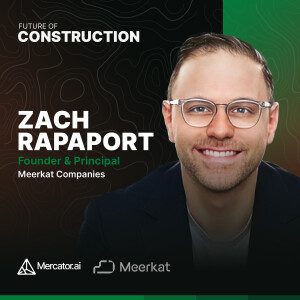
Tuesday Mar 25, 2025
Tuesday Mar 25, 2025
When Zach Rapaport's father handed him a broom instead of a project management role after college, it sparked an unlikely journey from sweeping construction sites to becoming Founder & Principal at Meerkat Companies — and managing 150,000 square feet of development projects in just its first year.
In this episode of The Future of Construction, Zach tells Chloe how he feeds complex land ordinances into AI "cauldrons" to qualify development opportunities in minutes rather than hours, his surprising success with Gen Z employees who consistently arrive at the office before he does, and why he rejected the venture-capital model to build a sustainable company that prioritizes employee psychological safety over rapid expansion.
Zach also shares the transformative moment when he saw families enjoying a restaurant he'd built, cementing his passion for hospitality construction over warehouse development.
Topics discussed:
Using AI to rapidly assess land ordinances and development opportunities, reducing decision time from hours to minutes by efficiently processing complex regulatory documents to get faster thumbs up/down decisions.
Successful strategies for hiring and retaining Gen Z talent in construction, focusing on flexibility, site visits that showcase tangible results, and creating an environment where passion is contagious.
The tangible rewards of construction that transcend generations and give the visceral satisfaction of transforming spaces and seeing people enjoying environments you helped create.
Creating sustainable growth models focused on revenue-driven expansion rather than venture capital infusion, prioritizing employee stability and psychological safety.
The shift toward strategic partnerships between smaller firms rather than mergers and acquisitions, allowing companies to maintain sovereignty while collaborating on larger projects.
Modern approaches to project management, including remote collaboration with design firms globally, leveraging tools like Zoom and 3D modeling services to break geographical limitations.
Emerging construction tech innovations, including Adaptive (financing for smaller GCs), Sites (retail space marketplace), and Pillar (development site platform for identifying optimal locations).
How time saved through AI tools is reinvested in organizational efficiency, creating psychological safety for teams, and building sustainable business operations.

Monday Dec 16, 2024
Monday Dec 16, 2024
In this episode of The Future of Construction podcast, Chloe welcomes Sam Dowd, Sales Director at Viking Fence & Viking Rentals. Together, they dive into the importance of building community within the construction industry, highlighting how Sam's Central Texas Construction and Commercial Real Estate Happy Hour fosters valuable connections among professionals.
The conversation also explores the critical role of mental health and well-being in the workplace, emphasizing that prioritizing these aspects can lead to enhanced productivity and stronger relationships. Tune in to discover how cultivating a supportive environment can transform both personal and professional dynamics in construction.
Topics discussed:
The significance of community-building in the construction industry and how it fosters relationships that extend beyond business transactions and enhance collaboration.
The critical role of mental health awareness in the workplace and its impact on employee well-being and productivity within the construction sector.
Strategies for preventing burnout among construction professionals and the importance of maintaining a healthy work-life balance in a demanding industry.
The value of personal connections in business development and how trust is built through genuine relationships rather than transactional interactions.
Insights on how to engage young professionals in the construction industry and the evolving landscape of networking and relationship-building.
The challenges of scaling community events and maintaining a welcoming atmosphere as attendance grows significantly over time.
The importance of stewardship in leadership roles and how it influences team dynamics and employee engagement within organizations.
How adopting technology can streamline workflows and reduce the administrative burden on sales professionals, allowing them to focus on relationship-building.
The shift in industry culture towards prioritizing mental health and the proactive measures companies can take to support their employees.
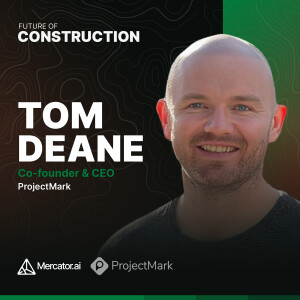
Thursday Nov 07, 2024
Thursday Nov 07, 2024
In this episode of The Future of Construction, Chloe chats with Tom Deane, Co-founder & CEO at ProjectMark. Tom shares his insights on the evolving landscape of construction technology, including the challenges of technology adoption within the industry and the need for a cultural shift and executive buy-in to ensure successful implementation.
Tom also highlights the importance of understanding workflows and the role of curiosity in driving innovation. Additionally, he reflects on the balance between maintaining day-to-day operations while integrating new tools, providing valuable strategies for construction leaders looking to enhance their business development and marketing efforts.
Topics discussed:
The importance of fostering a culture of curiosity and innovation within construction companies to facilitate successful technology adoption and implementation.
Strategies for overcoming resistance to change in the construction industry, emphasizing the need for executive buy-in and user engagement.
The role of effective communication in ensuring that all team members understand the benefits of new technology and its impact on workflows.
Insights on how to balance day-to-day operations with the integration of new tools and technologies in construction projects.
The significance of understanding workflows and identifying pain points to drive meaningful software development and enhance user experience.
The evolving landscape of construction technology and the emergence of innovative solutions to address industry challenges.
The value of building strong relationships with early adopters and leveraging their feedback to refine products and services.
The challenges of competing with legacy systems and the necessity for simplicity and ease of use in new software solutions.
The importance of continuous learning and adaptation in both startup environments and the construction industry to stay relevant and competitive.

Thursday Oct 17, 2024
Thursday Oct 17, 2024
In this episode of the Future of Construction podcast, Chloe sits down with Francis Hester, CEO of Captain Hook Dumpster Rentals, to explore the evolving landscape of the construction industry. Francis shares his entrepreneurial journey and the pivotal moments that shaped his business.
Together, they also parse the distinction between efficiency and effectiveness, emphasizing the importance of identifying the right objectives in business operations. Francis also discusses the significance of a customer-centric approach and how understanding client goals can drive success. Additionally, he highlights the challenges and opportunities of integrating technology into traditional industries, offering valuable insights for leaders looking to innovate and adapt.
Topics discussed:
The distinction between efficiency and effectiveness, and why leaders must prioritize understanding the right objectives over merely improving operational efficiency.
The importance of a customer-centric approach in the construction industry, focusing on aligning business strategies with client goals to drive success.
Challenges faced when integrating technology into traditional construction practices, including resistance to change and the need for clear communication.
Insights on the entrepreneurial journey, including key lessons learned and pivotal moments that can shape an approach to business leadership.
The role of innovation in the construction industry, and how companies can adapt to stay competitive in a rapidly changing market.
Strategies for fostering organizational clarity, enabling team members to make autonomous decisions that align with overall business objectives.
The impact of institutional knowledge in construction, balancing the benefits of experience with the need for technological advancement.
The significance of understanding capacity within a business, and how it influences project delivery and resource management.
The necessity of defining clear objectives before implementing technology, ensuring that solutions align with the overall goals of the organization.
The theory of constraints and its application in identifying the right problems to solve, leading to more effective decision-making within teams.
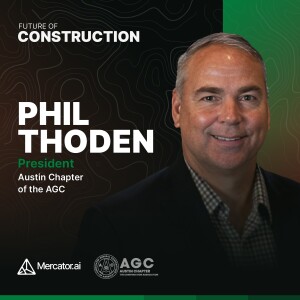
Thursday Sep 26, 2024
Thursday Sep 26, 2024
In our inaugural episode of The Future of Construction podcast, our host Chloe Smith, Founder and CEO of Mercator.ai welcomes Phil Thoden, President of the Austin Chapter of the AGC. Phil Thoden emphasizes the critical role of technology in enhancing efficiency and problem-solving, advocating for the adoption of digital tools to streamline processes. Phil also discusses the importance of cultivating a welcoming culture to attract younger talent, highlighting how a positive onboarding experience can make a significant difference.
Additionally, Phil shares his perspectives on the future of the construction industry. Phil also highlights the importance of fostering a welcoming culture to attract younger talent, ensuring they feel valued and engaged. He also discusses the need for diversity within the workforce, explaining how showcasing diverse individuals can reshape perceptions and broaden the talent pool.
Topics discussed:
How embracing technology, particularly AI and digital tools, can streamline construction processes and enhance overall efficiency in project management.
The importance of creating a welcoming culture to draw in younger generations, ensuring they feel valued and engaged in the industry.
The significance of showcasing diverse individuals in construction to reshape industry perceptions and attract a broader talent pool.
The need for cultural changes within the industry to address issues like overwork and stress, promoting better work-life balance.
How effective communication and collaboration among team members are essential for successful project execution and minimizing conflicts on job sites.
The importance of adopting sustainable practices and technologies to ensure the long-term viability and success of the construction sector.
The transformative impact of technology in construction, highlighting how digital tools can streamline processes and improve project efficiency.
How a strong onboarding process is vital for new hires, helping them integrate smoothly into the company and feel supported from day one.
The significance of showcasing diversity within the construction industry to reshape perceptions and broaden the talent pool.


